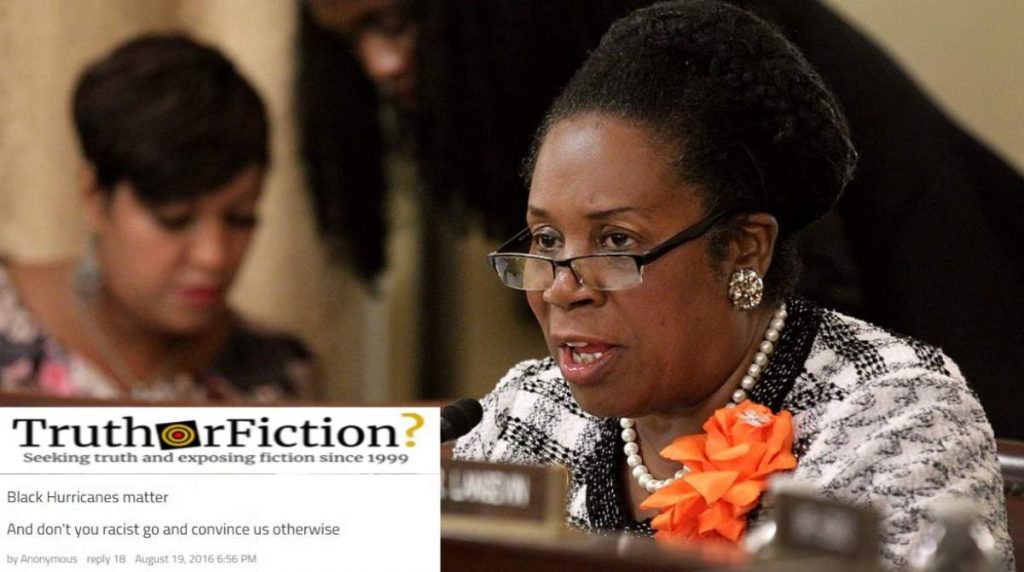A call from Texas Rep. Sheila Jackson Lee in 2003 for more diverse nomenclature regarding hurricanes first led to criticism, then to years of predictably racist distortions as the story spread online.
The Democratic lawmaker’s comments were first reported by The Hill; however, that site’s archives do not mention the story. A transcription available on online message boards reads:
Hurricane Latonya? Hurricane names raise a warning The 2003 hurricane season is here, and that means a whole new list of names such as Larry, Sam and Wanda ready to make tropical-storm history.
Although Spanish and French names are included in this year’s lineup, among them Juan and Claudette, which struck Texas last week, popular African American names, like Keisha, Jamal and Deshawn, are nowhere to be found.
Some black lawmakers don’t seem to mind, but Rep. Sheila Jackson Lee (D-Texas) does. “All racial groups should be represented,” said Lee.
Lee’s remark has also been referenced in separate stories published years later regarding the World Meteorological Organization’s naming system for hurricanes.
As the television news outlet NewsOne reported in 2013, though, the remark also made her an easy target for right-wing broadcasters like Rush Limbaugh, who said:
It is these elected Black leaders, the civil-rights coalitions – they’re the ones that keep causing all this racial divide; they’re the ones that keep calling attention to all this. They’re the ones that keep stirring this pot. They’re the ones who don’t want there to be any colorblind society. They’re the ones who keep being agitated and trying to agitate others over all this, and now it’s descended into the meaningless element of the names of hurricanes.
As the story moved from news sites to fringe-level forums, the claim was further mutated into a “joke” that Jackson Lee had said, “Black hurricanes matter”:

Also lost in the rush to make “jokes” at Jackson Lee’s expense is the fact that the naming of hurricanes has evolved over time, as the National Hurricane Center explains on its website:
In 1953, the United States abandoned a confusing two-year old plan to name storms by a phonetic alphabet (Able, Baker, Charlie) when a new, international phonetic alphabet was introduced. That year, the United States began using female names for storms.
The practice of naming hurricanes solely after women came to an end in 1978 when men’s and women’s names were included in the Eastern North Pacific storm lists. In 1979, male and female names were included in lists for the Atlantic and Gulf of Mexico.
As the Washington Post reported in 2014, even this change led to grousing, including from Houston Chronicle columnist Joe Doggett; Doggett called the introduction of Hurricane Bob in 1979 “utterly ridiculous”:
I am insulted and offended by this sell-out labeling of storms. “Bob” rather than “Barbara” or “Brenda” or “Betsy” typifies the lack of character that seems to be stifling the 70s.
Whoever insisted that a proportionate number of tropical storms must now sprout whiskers certainly couldn’t be from around here. That decision, which shows a total void of tropic sensitivity and respect, was surely made in some landlocked office far removed from salt breeze and common sense.
The National Oceanic and Atmospheric Administration (NOAA) announced in May 2022 that as many as 21 named storms — including tropical storms as well as hurricanes — could emerge this year.
Jackson Lee remains in office as of August 2022, though she has remained a target of right-wing disinformation campaigns.
Update 8/30/2022, 3:44 p.m. PST: This article has been revamped and updated. You can review the original here. — ag
- What's in a Hurricane Name?
- The Art — and Politics — Behind Naming a Hurricane
- Black Conspiracy Theory 101: Did A U.S. Congresswoman Call For Hurricanes To Be Named Blacks?
- Tropical Cyclone Naming History and Retired Names
- Himicanes and Hericanes: In 1970s, Some Argued Male-Named Hurricanes Would Not be Respected
- NOAA Hurricane Forecast 2022: Up to 21 Named Storms Possible; as Many as 10 Hurricanes Could Form

